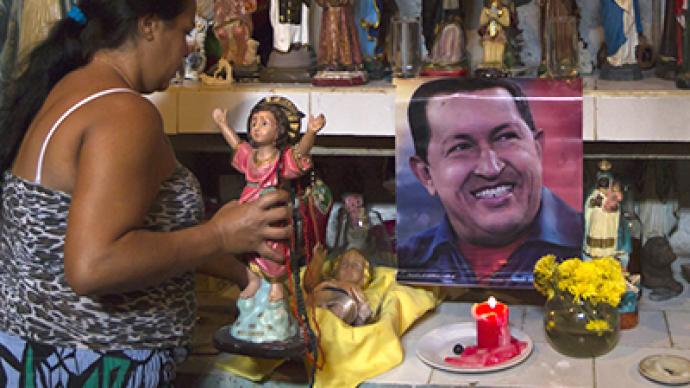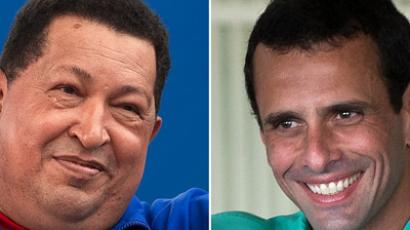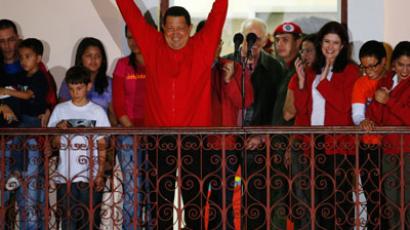Chavez health crisis: Power transition row escalates

As President-elect Hugo Chavez's ability to lead remains in doubt after cancer surgery, his allies have chosen to retain the Speaker of the National Assembly. The reelection is seen as countering concerns about political change in Venezeula.
Diosdado Cabello, a member of the ruling party, was confirmed as Speaker by Venezuela’s National Assembly on Saturday in a sign of solidarity with Hugo Chavez. Meanwhile, the Venezuelan government and opposition have offered rival interpretations of the country’s constitution and whether Hugo Chavez's inauguration ceremony may be postponed.
Vice President Nicolas Maduro admitted in a Friday interview that Chavez may not be sworn on the January 10 inauguration. The veteran socialist politician is thought to be fighting for his life in a Cuban hospital after undergoing his fourth cancer operation in the last two years.The Venezuelan government said Chavez has developed “respiratory deficiency” due to a lung infection following the surgery, and that his “delicate” condition requires further treatment.Maduro challenged the notion that Chavez failing to give his oath before the National Assembly as scheduled would automatically grant presidential powers to the next person in the line of succession – the speaker of the assembly, who would then call a new election. The Venezuelan opposition has called for the speaker to be granted presidential powers.“The formality of [Chavez's] swearing-in can be resolved in the Supreme Court at the time the court deems appropriate in coordination with the head of state,” Maduro claimed.The passages of the Venezuelan Constitution describing the procedure are open to interpretation. They set a deadline for an inauguration before the country's legislators; if that is not possible, the president-elect may also swear the oath to the judiciary. However, the constitution does not explicitly outline whether the deadline applies to the swearing-in by the Supreme Court.Vice President Maduro waved a blue copy of the constitution during the interview and read passages from it, calling on the opposition to respect the law. The succession dispute has unfolded amid rumors on social media of Chavez being comatose or dead. Further speculation has been fueled by the scarcity of information about the president’s condition.
Geopolitical analyst Eric Draitser told RT that Chavez’s opponents are taking advantage of the situation to undermine the government.“What is important is the fact that the opposition is using this as a political mechanism by which they can try to delegitimize the government in Venezuela,” Draitser told RT.A failed coup d'état back in 2002 demonstrated the base of support Chavez has in the country “could not be shaken” even by an international force, Draitser added. “So what they are attempting to do now is to use his health situation to break apart that base of support and convince people that Chavez is unable to serve.”The Venezuelan constitution explicitly says that new elections can only be called if, and only if, the elected president is permanently unable to serve, he explained. “And there is no indication that Chavez won’t recover from where he is now.”
Information Minister Ernesto Villegas described the speculation over Chavez health as a “psychological war.”“The Venezuelan people about the psychological war that the transnational media complex has unleashed around the health of the chief of state, with the ultimate goal of destabilizing the Bolivarian Republic of Venezuela,” he said in an interview on Thursday.Government officials have insisted that Chavez is conscious, and will soon recover. However, calls to pray for his health on state television have conveyed a less optimistic message to Venezuelans.Some believe the government may be covering up the issue since Chavez is unlikely to recover, and his government needs time to regroup and consolidate before an imminent election.The main opposition candidate in the October election, the 40-year-old governor of Miranda state Henrique Capriles, won an impressive 44 percent of the vote. If Maduro is pitted against him, the battle for voters' support is expected to be difficult even though Chavez officially endorsed his vice president as a possible successor before going in for surgery.Chavez has been in power in Venezuela since 1999. His current term will end in 2019, unless he dies from cancer or the opposition wins in a snap election. The government has an advantage in the debate, however, and maintains considerable power even without a sworn-in president on its side.














